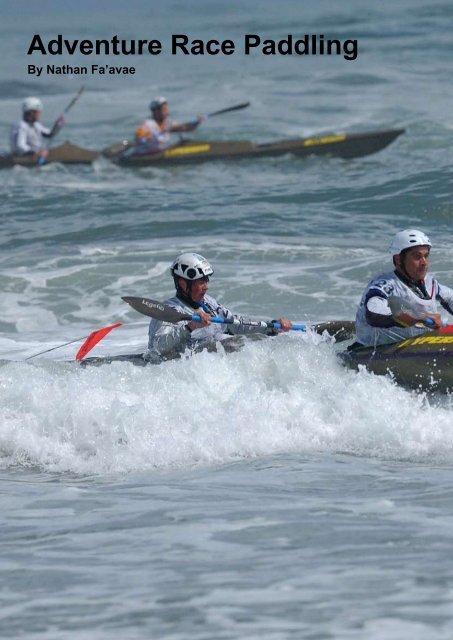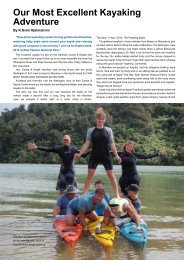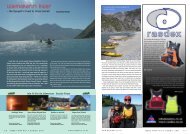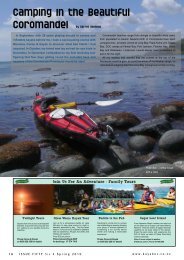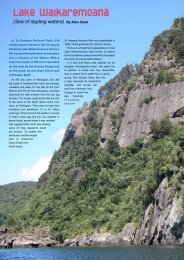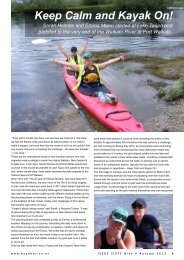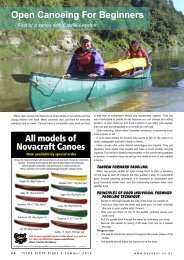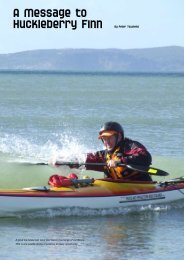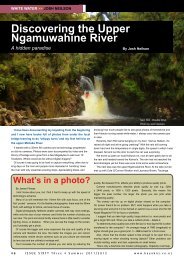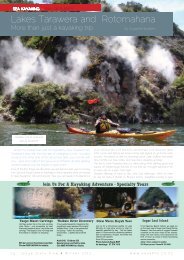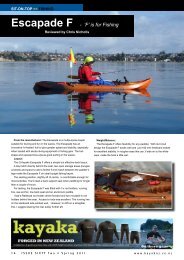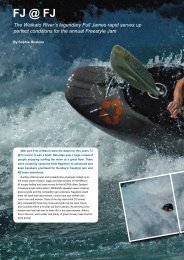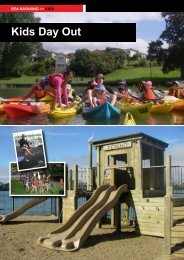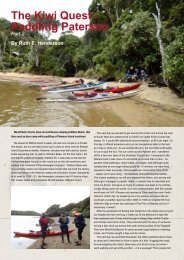Adventure Race Paddling - New Zealand Kayak Magazine
Adventure Race Paddling - New Zealand Kayak Magazine
Adventure Race Paddling - New Zealand Kayak Magazine
You also want an ePaper? Increase the reach of your titles
YUMPU automatically turns print PDFs into web optimized ePapers that Google loves.
<strong>Adventure</strong> <strong>Race</strong> <strong>Paddling</strong><br />
By Nathan Fa’avae
Patagonian Lakes in Argentina, the Yellow River and Hydro Dams<br />
in China, steep white water descents in France, the hot Mediterranean<br />
Sea, Milford Sound in early morning dark, Lake Wakatipu at night into<br />
the glowing lights of Queenstown – these are some of the paddling<br />
experiences from my 2012 <strong>Adventure</strong> Racing season with Team<br />
Seagate, NZ <strong>Adventure</strong> Racing team. (Sophie Hart, Chris Forne, Trevor<br />
Voyce).<br />
<strong>Kayak</strong>ing is one of the three core disciplines in adventure racing,<br />
joining hiking and mountain biking. The paddling within an adventure<br />
race is dynamic and always presents new challenges. For starters,<br />
navigation is required so waterproof maps and a deck compass are<br />
needed to make sure checkpoints are reached. The paddling sections<br />
are more often than not, ‘dark zones’, which means during the darkness<br />
hours, progress on the water is forbidden forcing teams to camp out,<br />
either comfortably or miserably, often a result of how much gear a team
is prepared to carry. These dark zones can be very strategic and can<br />
have a big outcome on the racing.<br />
In the 2002 Southern Traverse our team were forced to stop for nine<br />
hours on the Wairau River bank in Marlborough, right beside the road.<br />
With only 10 km to paddle the next morning and a big lead already,<br />
the race win was ours but we needed to wait until daylight to complete<br />
the paddle. We’d just got off the river wondering what we’d do when a<br />
passing car spotted us and stopped, it turned out it was a cycling mate<br />
of mine who lived locally. He asked if we needed anything. An hour later,<br />
we were sitting around a fire, on mattresses, with blankets, drinks and<br />
scoffing hot fish and chips.<br />
For me the biggest challenge with the paddling in the sport is we<br />
nearly always get different boats to paddle. Here at home we all have<br />
our favoured craft and equipment, the stuff we like and are used to.<br />
However, racing around the world we have to adapt to different craft<br />
for every race and sometimes paddles too. Most of the time they are<br />
doubles either inflatable or plastic. Some have rudders, some don’t.<br />
Some are okay, some aren’t, I’ve never yet raced in a boat I’ve decided<br />
to buy.<br />
In the 23 years adventure racing has been going, Kiwi teams have<br />
built a legacy on being exceptional boaters, with only South African and<br />
Australian teams ever threatening to topple that title. There have been<br />
a great number of international events won by <strong>New</strong> <strong>Zealand</strong> teams<br />
who have forged leads with paddle in hand. From my observation, it’s<br />
the Kiwis ability to quickly learn the behaviour and performance of the<br />
different vessels supplied. Every race I see ultra fit and conditioned<br />
paddlers not being able to utilise their power because the skill needed to<br />
steer and manoeuvre the boat is lacking, resulting in more energy going<br />
into basic steering and minimal energy going into forward gain.<br />
Over 800 competitors will vie for places in the 31st Anniversary<br />
Speight’s Coast to Coast race on February 8th and 9th 2013.<br />
Will you be there?<br />
Grade Two certification<br />
and brush up courses run<br />
through out the year.<br />
Contact your nearest<br />
Canoe & <strong>Kayak</strong> Centre<br />
for details.<br />
8 ISSUE SIXTY Seven • Christmas 2012 www.kayaknz.co.nz
In August 2012 our team raced the Ordos <strong>Adventure</strong> Challenge<br />
held in Inner Mongolia, China. They had brand new plastic double sea<br />
kayaks for the event but they had not been assembled correctly. Some<br />
teams managed to get them sorted before the race started, some didn’t.<br />
The other issue was the steerage system for the rudders was designed<br />
to fit the average Asian, meaning anyone taller than five foot could not<br />
get enough rudder adjustment to steer. For many teams this meant the<br />
taller paddlers had to go in the front, often leaving the less experienced<br />
partner in the back to steer without being able to see clearly. It’d be fair<br />
to say it created some drama within teams and on the water. It was a<br />
great surprise for many teams to see me (six foot +), steering the boat.<br />
I’d found a way of reversing the steering pedals allowing tall people to<br />
steer, but I’d kept that classified, subsequently, our team posted the<br />
fastest paddle time. With all the rudder issues, the <strong>Race</strong> Organisers<br />
decided for the next paddle stage the rudders would be banned.<br />
They took the rudders out and put them in the rear hatch, cables still<br />
attached. On the final paddle stage because the rear hatch was not<br />
sealed properly due to the cables and rudder being stuffed in, over time<br />
waves filled the rear compartment with water, taking on at least 50 litres.<br />
For the final 3 km of the race, it was the hardest I have ever had to work<br />
to keep a boat going straight and I’m sure Sophie who was in the front<br />
was starting to think she’d paired up with a muppet.<br />
I have been asked often how come the <strong>New</strong> <strong>Zealand</strong> teams are<br />
always so strong in the kayaks. The obvious answer is that most of<br />
the top adventure racers have all raced a number of Speight’s Coast<br />
to Coasts, so they know how to paddle a long thin kayak 67 km down<br />
a Grade Two river for over three hours, after a few bikes rides and a<br />
mountain run. The skills required to do this demand a huge amount<br />
of time invested in mastering paddling. That’s the easy answer. If I<br />
were to delve a bit further, the athletes with a white water kayaking<br />
background raise the bar another level. They have an additional range<br />
of paddle strokes specific for a rudderless kayak that can give a handy<br />
advantage. In the 2005 <strong>Adventure</strong> Racing World Champs in NZ, our<br />
team was paddling to victory when a rudder was snapped off a racing<br />
double in the Inangahua River, making it really difficult to steer. Trying<br />
to beat a dark zone it was decided I should have a try in it. Although it<br />
wasn’t easy, some basic white water strokes were enough to keep going<br />
forward and we made it off the river in time. The point I’m making is<br />
that to be a complete paddler in an adventure race, you really need to<br />
have a wide range of skills and experience: playing in river boats, racing<br />
boats and sea experience, which will all merge together to form the<br />
experience required.<br />
Within one race, teams can find themselves in action pumping white<br />
water, in ocean swells and on lakes, in sheltered and exposed water,<br />
in daylight or at night, in tropical heat or chilling cold. As a passionate<br />
paddler, I’m most excited about the water stages of any adventure race<br />
and that’s part of the reason I keep going back for more.<br />
Keep on paddling NZ!<br />
COMPETITIVE / COMFORTABLE / A TRUE CONTENDER<br />
Ruahine <strong>Kayak</strong>s<br />
Designers and Manufacturers of<br />
Multisport & <strong>Adventure</strong> Racing <strong>Kayak</strong>s<br />
Phone: 021 273 0550<br />
kevin@ruahinekayaks.co.nz www.ruahinekayaks.co.nz<br />
Ruahine 11-07 V1.indd 1<br />
www.kayaknz.co.nz<br />
25/07/2011 10:23:11 a.m.<br />
ISSUE SIXTY Seven • Christmas 2012 9


